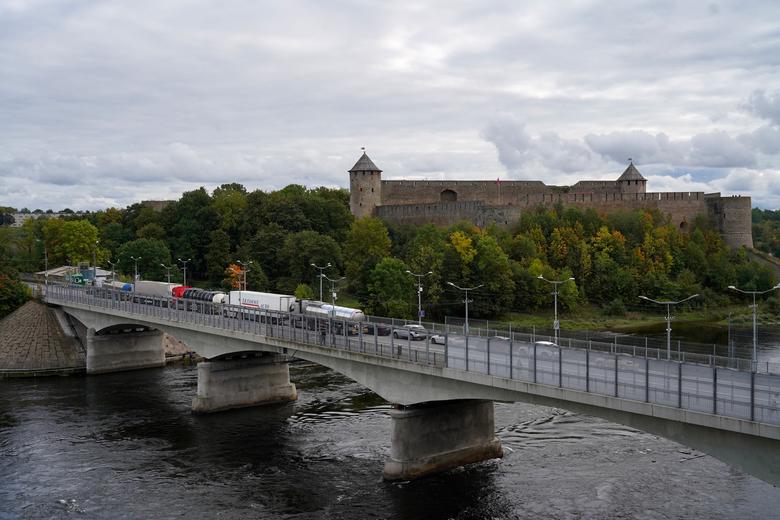Baltic states and Poland close doors to Russian tourists

A general view of the bridge over Narva river at the border crossing point with Russia in Narva, Estonia September 18, 2022. REUTERS/Janis Laizans
NARVA, Estonia — Four of the five European Union countries bordering Russia began turning away Russian tourists at midnight on Monday, saying they should not travel while their country is at war with Ukraine.
Poland, Estonia, Latvia, and Lithuania imposed new restrictions as Finland decided to remain open, though it has cut back the number of consular appointments available to Russian travelers seeking visas.
The move was the latest in a series of sanctions and other steps taken by the European Union or its member states since Moscow invaded Ukraine on February 24 in what it calls a “special military operation.”
The EU has banned all flights from Russia, leaving only rail and road transport links available, and this month it agreed to limit issuing of free travel Schengen zone visas.
Monday’s entry ban is targeted at tourists and excludes Russian dissidents seeking refuge in the EU along with lorry drivers, refugees, and permanent residents of EU countries as well as those visiting family members.
Article continues after this advertisementOn a cold and drizzly Sunday in Narva, an Estonian border town with Russian speakers making up more than 90% of its population, Russian citizens were hurrying to enter before new rules came into place.
Article continues after this advertisementREAD: Russia could attack Poland, Finland, Baltics—Polish PM
Vadim Koralyov, a 64-year-old retiree from St Petersburg, had bought an apartment in Narva so his daughter and grandchildren from Paris could visit him.
“Now I don’t know what to do. The border guard told me I won’t t be allowed to come here anymore,” he told Reuters.
Less than a tenth of some 4,000 Russians entering Estonia daily are losing the right under the new rules, officials said.
“People of Russia, do not try to cross the border, you’re not welcome here – you need to end the war against Ukraine and be gone from that beautiful country!,” Latvian Foreign Minister Edgar Rinkevics tweeted.
Bloc split
The issue of travel to the EU has split the bloc, with capitals such as Berlin and Paris arguing that it would be counter-productive to ban ordinary Russians, a move advocated by Kyiv.
Finland, whose Prime Minister Sanna Marin earlier stated Russian tourists should not travel to the EU during the war, said such a ban could contravene the Schengen zone agreement that all countries honor visas issued by other countries in the zone.
“One country grants a visa, another one denies it. That’s certainly not very desirable for the system,” Finland’s President Sauli Niinisto told reporters in Helsinki last week.
Estonian Prime Minister Kaja Kallas expressed her frustration over the divisions within the EU, warning that many Russian travelers will now head for the Finnish border.
“There is a loophole, and the loophole is Finland,” Estonian Prime Minister Kaja Kallas told Reuters in an interview on Saturday.
“So it’s not entirely effective… but it’s still better than nothing,” she added. “I hope that, sooner rather than later, they will have to do this as well”.
For Mikhail Ivanov, a 35-year-old Russian citizen traveling by coach from St Petersburg to Tallinn on Sunday, visiting friends in Estonia may get more complicated.
“I will still be able to get to Estonia through other countries,” he told Reuters shortly after crossing into Narva.
Russia said it would retaliate against the curbs, but would not close itself off from the bloc.